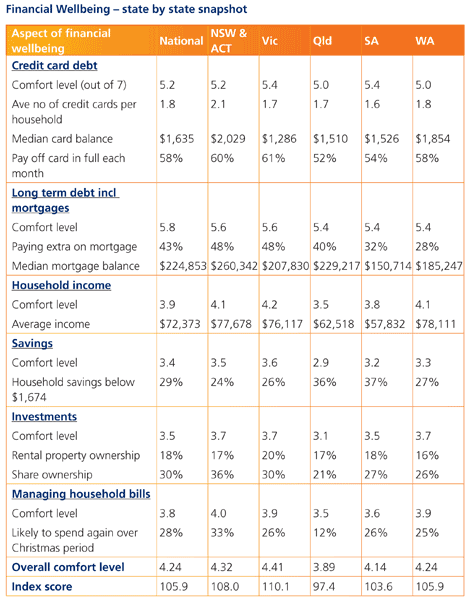Victorians most comfortable with their mortgages: ING Direct
Despite a stalling property market, Victorian households remain the most comfortable about their financial position, according to the latest ING Direct Financial Wellbeing Index, which surveyed more than 1,000 household financial decision makers at the end of September and start of October.
Victorian households enjoy Australia’s highest level of financial wellbeing, with an Index score of 110.1 compared with a national index score of 105.9.
The state’s residents lead the nation for comfort levels across three leading indicators including comfort with their mortgage (5.6 out of a possible 7), household income (4.19) and personal savings (3.58).
The survey also reveals that Victoria has the highest proportion of landlords, with one in five respondents earning rental property income, compared with a proportion of between 17% and 18% in the other states and a national average of 18%.
In contrast, NSW households have the greatest preference for the share market, with more than a third (36%) having investments in listed companies compared with a national average of 30%.
NSW households are also feeling more comfortable about their financial situation, with the state index rising to 108.0 in the third quarter, up from 104.5 in the second quarter.
Mortgage holders in NSW feel as comfortable about their level of mortgage debt as those in Victoria while NSW households are also the most comfortable about paying their regular bills scoring a comfort rating of 3.99 out of 7 compared with 3.84 nationally.
In addition, NSW households are more likely to renew spending in time for the festive season than residents of any other state, with 33% saying Christmas is the circuit breaker that will revitalise their spending.
Only a quarter of Victorians say they will increase their spending over the Christmas period, according to the survey.

Source: ING Direct
Queenslanders are the least comfortable about their finances with the “challenge of rebuilding disaster-ravaged households” taking its toll on financial wellbeing.
The Queensland Index is 97.3, down from 105.2 in the second quarter, with median household income falling to $62,518 in the third quarter compared with $72,737 nationally. Median household savings are worth $2,905, below the national figure of $7,812. One in four (24%) households has no personal savings, and 9% say they are falling behind on their mortgages.
Queenslanders are also the least likely to increase their spending in the lead up to the festive season. One in three (30%) don’t expect to loosen the purse strings in the foreseeable future.
However, there are some bright spots for Queensland. Median figures for household credit card debt and home loan balances show Queenslanders are about on par with national figures.
Financial wellbeing has also declined in WA, with the state’s index score dropping to 105.9 in the third quarter down from 107.4 in the second quarter.
The overall Financial Wellbeing Index for the third quarter climbed to 105.9 – a rise from its lowest level in the first quarter of the year (104.8) and second quarter (105.8), indicating confidence is improving.
“Despite a volatile quarter in financial markets, Australian households are proving their resilience as they get debt under control and build a strong savings base,” says Don Koch, CEO of ING Direct.